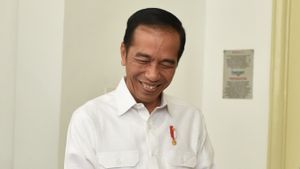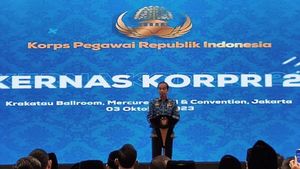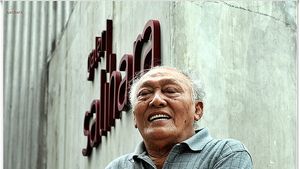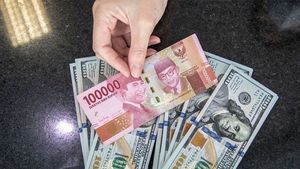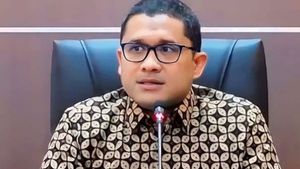JAKARTA – Dynasty politics has recently become an interesting topic of conversation both in political circles and ordinary people. One of the reasons is of course the joining and election of Kaesang Pangarep as General Chair of the Indonesian Solidarity Party or PSI.
Kaesang's entry into PSI plus the rumors that Gibran Rakabuming Raka has not yet stopped becoming a vice presidential candidate to accompany Prabowo Subianto if the Constitutional Court's lawsuit regarding the minimum age limit for vice presidential candidates is granted, has made the discourse that President Joko Widodo is building dynastic politics even more prominent.
Lecturer in Political Sociology at Wijaya Kusuma University, Surabaya, Umar Sholahudin, explained that dynastic politics, or often also called kinship politics, was genealogically and historically born and developed in a monarchy system, where power is passed down from generation to generation from father to son. This is done in order to ensure that power remains within the family circle.
Unfortunately, the trend of dynastic politics also appears as a neopatrimonialistic symptom in modern political society. The seeds have long had traditional roots, namely in the form of a patrimonial system, which prioritizes political regeneration based on genealogical ties, rather than a merit system, in weighing achievements.
"Politicians utilize this neopatrimonial culture as a political strategy to gain and maintain power through procedural political channels in this context, namely democracy. "The children, family or relatives of the elite enter the institutions that have been prepared, namely political parties," said Umar, Monday 3 October.
Therefore, it is not surprising that in Indonesia the practice of dynastic politics also occurs. Before Jokowi was said to be building dynastic politics, the Indonesian people certainly saw that the family of the proclaimer, Soekarno, was one of the main examples of dynastic politics. Apart from Soekarno who was the first president, there was Megawati Soekarnoputri who became the fifth president and the sixth President of the Republic of Indonesia, Susilo Bambang Yudhoyono (SBY). Currently, the public certainly knows the names of Puan Maharani and her eldest son SBY, Agus Harimurti Yudhoyono (AHY).
In the regions, the practice of dynastic politics is more obvious. In various regional elections, the public is familiar with several dynasties, such as the Limpo Dynasty in South Sulawesi, the Narang Dynasty (Central Kalimantan), the Sjahroeddin Dynasty (Lampung), and the Fuad Dynasty in Madura.

Perhaps the most phenomenal dynasty politics in Indonesia was the rule of the Chasan Sochib Dynasty in Banten. In the same period, almost all members of this dynasty family held political positions in Banten.
Starting from Ratu Atut Chosiyah (son) as Governor of Banten from 2007 to 2015, Ratu Tatu Chasanah (son) as Deputy Regent of Serang 2010-2015 and Regent of Serang 2016-2020, and Airin Rahmy Diany (daughter-in-law) as Mayor of South Tangerang 2011 until 2020.
Umar believes that the practice of dynastic politics is not just a political phenomenon, but has become an uncontrolled political endemic that has spread to various regions. The proliferation of dynastic political practices will of course threaten the growth and development of healthy democracy in Indonesia. Because, with dynastic politics, state and government governance can be carried out in the "bedroom" of the house.
So, what is the cause of the proliferation of dynastic politics in Indonesia? Political researcher from BRIN, Wasisto Raharjo Jati, in his article published in the Journal of Community Sociology in 2013 entitled "Revivalism of the Power of Familism in Democracy: Political Dynasties at the Local Level" said that familism in local democracy is influenced by various political sources such as populism, tribalism and feudalism which the three form a typology of different dynastic political regimes in Indonesia.

He gave an example, the character of dynastic politics in South Sulawesi is tribalism dynasties which are formed from the reproduction of ethnic cultural rites, primordial ties, political clans and social stratification. However, Umar Sholahudin is of the opinion that the absence of regulations that regulate/restrict people from advancing in political contestation has caused dynastic politics to develop in the country.
He said that the Constitutional Court decision no. 33/PUU-XIII/2015 concerning Review of Article 7 letter r of Law Number 8 of 2015 concerning Regional Head Elections cancels provisions that prohibit regional head candidates from having conflicts of interest with incumbent regional heads.
The Constitutional Court argued that articles like this violate human rights and are discriminatory. This MK decision is a breath of fresh air for the flourishing institutionalization of dynastic politics. Thus, any relative who is still related to the incumbent regional head may become regional head as long as they are elected by the public.
Second, continued Umar, the internal institutional system of political parties is still very weak, which is characterized by a breakdown in internal cadre formation. Political parties rely more on genealogical ties than on the merit system (achievement, intelligence and effort). Third, in the midst of the stalled cadre formation, pragmatic and instant political action emerged, namely looking for candidates who have kinship ties with officials who have a chance of winning.
“Fourth, the strong political oligarchy within political parties. Election of regional heads through the nomination of candidates by political parties tends to be based on the desires of party elites, rather than rationality by considering the capacity, track record and integrity of the candidate. "Fifth, voters' political literacy and education is still weak regarding the bad impacts of dynastic political practices," he explained.
اقرأ أيضا:
So, does the practice of dynastic politics have a bad impact? According to Umar, dynastic politics will certainly hinder and even destroy the internal cadre system of political parties because political parties are only used as political machines.
Recruitment by political parties is based more on the popularity and wealth of candidates to achieve victory which triggers instant candidates to emerge from celebrities, businessmen, 'blue blood' or dynastic politics, without going through a cadre formation process.
Second, dynastic politics will give birth to a political oligarchy, because in this exclusive system only certain people have access and gain the baton of power, similar to a royal political system, and only they will control the running of the government.
Third, factually, dynastic politics is closer to the practice of abuse of power and is full of corrupt practices. KPK data, said Umar, shows that in areas where dynastic politics occurs, most of it results in corrupt practices. The most obvious phenomenal lesson is the dynastic politics that occurred in Banten Province, where fathers, sons, sons-in-law, nephews and relatives of former Governor Ratu Atut Chosiyah held various lines of power, both executive and legislative.
“We may not be able to prohibit the emergence of dynastic political practices in electoral democracy. "However, at least it can be prevented and inhibited, first from the state side, comprehensive thinking and strong regulations are needed to at least limit it so that dynasties do not run rampant and damage the democratic order," he said.
Second, from the political party side, the public must encourage political parties to implement a gradual and multi-level candidacy system or model, develop a healthy system of meritocracy within the party, an open and transparent selection system, and consider capacity, integrity and track record rather than the closeness of kinship politics.
Third, from the voter side, it is necessary to intensify more rational and enlightened voter education which is carried out in a structured, systematic and massive manner. “Strong public political education to build a culture of critical political literacy in society. "Choose leaders because of their vision, mission and quality work programs, not because of political dynasty factors," added Umar.
A different opinion was expressed by political observer Hamdi Muluk. He believes that there is actually nothing wrong with dynastic politics. Because this phenomenon occurs all over the world, not just in Indonesia. Apart from that, a dynasty or clan does not only occur in politics, but occurs in all fields and professions.
He explained that psychologically, people who advance in the world of politics and have families who have been involved in politics beforehand have a distinct advantage, because they receive mentoring or training directly from their families. Especially if his family has won a general election contest.
"For example, if someone gets a political mentoring process from their uncle, father or something, that's an added value. People can't say "envy", so why be jealous, because by chance their father or uncle was involved in politics, then they received a mentoring process, so they already know the ins and outs of politics, this is also common in other professions. "For example, their children's musicians become musicians too, because they get the role model process, the learning process from first hand, from everyday life and the knowledge transfer process, the transfer of skills is faster, and the world doesn't complain too much about this," explained Hamdi.
This member of the selection committee for the leadership of the Corruption Eradication Commission (KPK) for the 2019-2024 period emphasized that what needs to be taken care of in the context of dynastic politics is not to trigger corruption, collusion and nepotism (KKN). “That's what people worry about, if a family is building a political dynasty. "Don't let power be misused for the things mentioned above," he added.
Even though it can be considered that dynastic politics is legitimate, political observer from UGM, Mada Sukmajati, revealed that the negative prejudice against dynastic politics in Indonesia is not without reason. This arises because most of the dynastic politics in Indonesia "expands corrupt practices" and does not make "public services better".
"Most dynastic political practices in Indonesia bring 'bad' results, unlike Singapore where dynastic politics has succeeded in bringing economic growth to the country," concluded Mada.
The English, Chinese, Japanese, Arabic, and French versions are automatically generated by the AI. So there may still be inaccuracies in translating, please always see Indonesian as our main language. (system supported by DigitalSiber.id)



